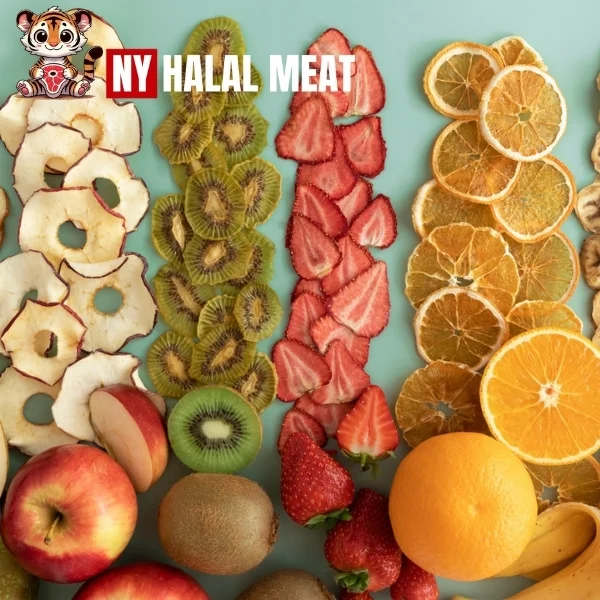Fresh vs Dried Fruits: Are They Halal?
What is Halal Food?
Halal is an Arabic term that translates to “lawful,” “allowed,” or “permissible.” These three terms are used to describe food that does not conflict with any Islamic laws. Halal food is free from any forbidden ingredients, such as pork, alcohol, or non-halal meat. Furthermore, halal food must be prepared and treated properly to ensure no contamination with haram (forbidden) substances. In the case of fruits, the primary concern is whether any haram substances are added during processing or preservation. Let’s examine the halal requirements for fresh and dried fruits.
Are Fresh Fruits Halal?
Unprocessed fruits such as apples, bananas, grapes, and oranges are naturally halal. These fruits come directly from nature and do not contain any ingredients that would render them haram. However, there are several factors to consider to ensure that the fresh fruits you eat remain halal:
- Pesticides and Chemicals: Fresh fruits may be grown using chemicals, pesticides, or fertilizers that could be harmful or non-halal. To avoid this, choose organic fruits or fruits from reputable sources.
- Cross-Contamination: There is a risk of fresh fruits becoming contaminated by non-halal foods if they are prepared or stored together. Ensure that fresh fruits are sourced from suppliers who follow halal guidelines.
In most cases, fresh fruits are halal unless issues arise from handling or chemical treatment. If the fruits are grown using halal practices and treated appropriately, they are safe to consume.
Are Dried Fruits Muslim Friendly?
Dried fruits are simply fresh fruits that have undergone dehydration to remove water content, which extends their shelf life and makes them easier to consume. As a rule, dried fruits are halal, but there are a few considerations regarding preparation and ingredients:
Using Additives and Preservatives
- Haram Additives: Some dried fruits may be processed with preservatives, sweeteners, or coloring agents that come from non-halal sources, such as alcohol-based preservatives or chemical compounds that are forbidden in Islam. Always check the ingredients to ensure no haram substances are used.
- Sugar Coating: Dried fruits like apricots, raisins, or cranberries are sometimes coated with syrup or sugar for flavor enhancement. In some cases, these sweeteners may be processed with alcohol, making the dried fruits unsuitable for halal diets. When purchasing dried fruits, opt for those that have minimal processing or are labeled as halal-certified.
Packaging and Handling
Some factories that produce and package dried fruits may also handle non-halal products, increasing the risk of cross-contamination. To ensure the halal status of dried fruits, check for halal certification labels and ensure that the fruits come from a reputable source.
Fresh vs Dried Fruits: A Comparison

| Aspect | Fresh Fruits | Dried Fruits |
|---|---|---|
| Naturally Halal | Yes, unless contaminated or treated with non-halal substances | Yes, but the specific type determines the case |
| Additives and Preservatives | Not common, unless chemically treated | Usually yes, contains preservatives or sweetening agents that may not be halal |
| Shelf Life | Shorter shelf life | Longer shelf life due to the drying process |
| Packaging | Safe in general but must be cautious of contamination | Risk of cross-contamination; check halal certification |
Conclusion
Both fresh and dried fruits can be halal, but it is essential to be mindful of their processing methods and handling. Fresh fruits are generally halal unless they are treated with non-halal substances or become contaminated. Dried fruits are also halal, but they may involve the use of preservatives or sweeteners that are not permissible under Islamic law. Always check for halal certification, read ingredient labels carefully, and choose products from reputable sources to ensure your fruits align with halal dietary guidelines.


